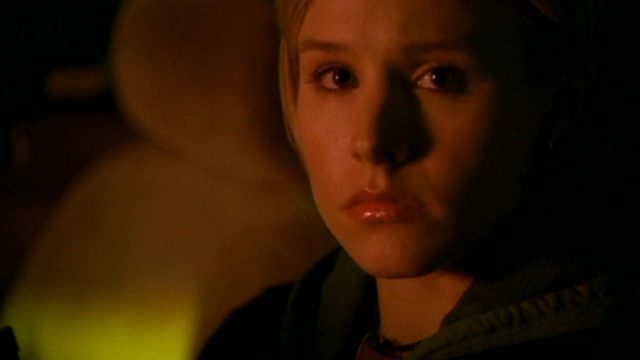Good morning, my sweets! Here is what I found this past week….
On the 4th, Isabel Cole of Bright Wall/Dark Room, examined how Veronica Mars uses the tropes of film noir:
“In some ways the show’s class politics—eat the rich and trust no cops—are classic noir, a genre which almost can’t help suggesting ideas about the connection between exploitation and wealth (‘All films about crime are about capitalism,’ explains Abraham Polonsky in the documentary Red Hollywood, ‘because capitalism is about crime’). But it expresses this attitude in formulations that feel startlingly current for a show which aired the entirety of its original run before the 2008 financial crash. Veronica introduces Neptune as “a town without a middle class,” a description that increasingly fits the country at large; her neat division of the town’s families into millionaires and those who work for them anticipates the discourse about the one percent. Fredric Jameson, in his study of Raymond Chandler, argues that his social content feels ahead of its time because the Los Angeles he lived in already embodied the social fracturing that would soon define the rest of the country. Perhaps, then, Neptune feels startlingly modern because it is no generic beach town, but an example of the type of city in which the new century was being shaped: a tech-boom beneficiary, Silicon Valley with oceanside views.”
Also on the 4th, Miles Surrey discussed why Mr. Robot is still must see tv, over at The Ringer.
“But all the plaudits Mr. Robot received for its first season died quickly with its second, as fans grew tired of Esmail continually toying with viewer perceptions in an ill-fated effort to slowly reveal predictable twists. If a consumer in the era of Peak TV has little patience for a new show to find its footing after a few episodes (this is why it’s important to harass your friends about the magic of Succession!), it stands to reason people will drop something just as quickly for losing some of its mojo. For what it’s worth, I found Mr. Robot’s second season to be occasionally frustrating, but still admirably ambitious: it was the closest TV got to feeling Lynchian in a long time before Showtime blessed us with Twin Peaks: The Return the following year. Still, the consensus won over, as Mr. Robot’s continued to bleed viewers and lose that intangible hype. (As far as I was aware, no more viewing parties were organized.) Just a year after Malek won a Best Actor Emmy, he wasn’t even nominated; same went for the series at both the Golden Globes and the Emmys. Suddenly, television’s Next Big Thing was just another ripple in a huge wave of viewing options.”
Sheila O’Malley revisited Angel Baby, a film I had no previously heard of, for Film Comment, on the 5th:
“Slowly, as the characters deteriorate, the color palette changes. Darker tones infiltrate. Shadows take on corporeal form. Scenes are broken up not by dissolves or fade-outs, but by white-outs, the glare obliterating the images. Cinematographer Ellery Ryan uses high speed film stock and a fluid style, swerving from hand-held camera work into hallucinatory angles and inserts. Gaps open up in the narrative, as Harry’s and Kate’s psychosis takes over. That bridge no longer hovers in the air. It turns instead into a beckoning precipice.”
Robert Greene of Sight & Sound, looked back on American Movie, on the 6th:
“To the point about exploitation: yes, the film is exploitative, but all documentaries are to some degree. When the subject happens to be struggling with money or addiction problems, as Borchardt is throughout the film, things can get ugly. It does feel at times like we’re laughing at the characters and not with them, reminiscent of the early works of Errol Morris, who made his name skirting the line between mocking and exulting in his subjects in films such as Vernon, Florida (1981). In American Movie that sense is heightened by Borchardt’s desperate desire to get his film made and seen. Yet it’s his status as comedic documentary character that gets him ‘out there’ more than his own work ever could.”
Finally, on the 7th, Naomi Gordon-Loebl explored the queerness of Bruce Springsteen, over at The Nation:
“For some of us, Bruce is also talking about something far more than just music. He’s describing an epiphanic moment of self-discovery, one in which he encountered a new vision of the person he might become and chose to embrace it. It’s a narrative that might particularly resonate with queer people, who are well aware of the possibility of a life-altering freedom that presents itself as the reward for stepping into your true self (even when that freedom comes, as is often the case, at great cost). Bruce is far from gay; some might argue he is one of the straightest men alive. But as one watches Springsteen on Broadway, it is easy to see why he has long been if not a queer icon, then at least a straight icon who is disproportionately beloved by many queers.”
Enjoy!

